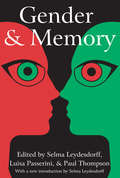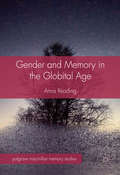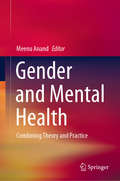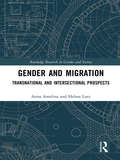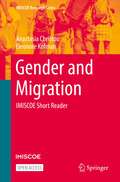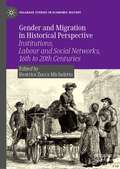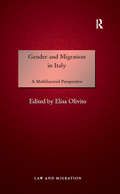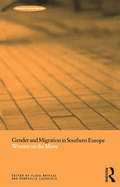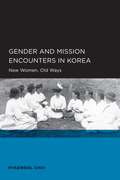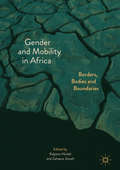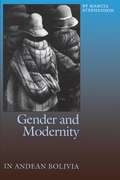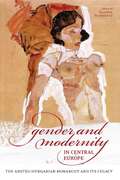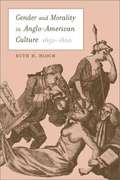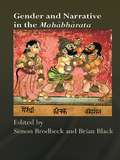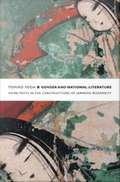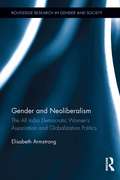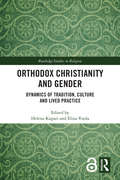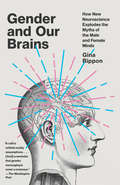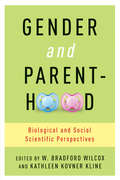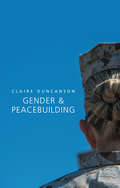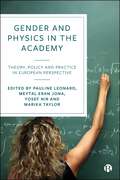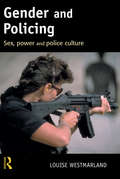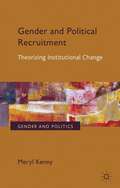- Table View
- List View
Gender and Memory: Baby Shower Registration - Signature Memory Keepsake - Expecting Baby Party Celebrations - Gender Reveal Visitor Registry
by Memory Narrative SeriesGender and Memory brings together contributions from around the world and from a range of disciplines--history and sociology, socio-linguistics and family therapy, literature--to create a volume that confronts all those concerned with autobiographical testimony and narrative, both spoken and written. The fundamental theme is the shaping of memory by gender. This paperback edition includes a new introduction by Selma Leydesdorff, coeditor of the Memory and Narrative series of which this volume is a part.Are the different ways in which men and women are recalled in public and private memory and the differences in men's and women's own memories of similar experiences, simply reflections of unequal lives in gendered societies, or are they more deeply rooted? The sharply differentiated life experiences of men and women in most human societies, the widespread tendencies for men to dominate in the public sphere and for women's lives to focus on family and household, suggest that these experiences may be reflected in different qualities of memory.The contributors maintain that memories are gendered, and that the gendering of memory makes a strong impact on the shaping of social spaces and expressive forms as the horizons of memory move from one generation to the next. They argue that in order to understand how memory becomes gendered, we need to travel through the realms of gendered experience and gendered language.
Gender and Memory in the Globital Age
by Anna ReadingThis book asks how 21st century technologies such as the Internet, mobile phones and social media are transforming human memory and its relationship to gender. Each epoch brings with it new media technologies that have transformed human memory. Anna Reading examines the ways in which globalised digital cultures are changing the gender of memory and memories of gender through a lively set of original case studies in the 'globital age'. The study analyses imaginaries of gender, memory and technology in utopian literature; it provides an examination of how foetal scanning alters the gendered memories of the human being. Reading draws on original research on women's use of mobile phones to capture and share personal and family memories as well as analysing changes to journalism and gendered memories, focusing on the mobile witnessing of terrorism and state terror. The book concludes with a critical reflection on Anna Reading's work as a playwright mobilising feminist memories as part of a digital theatre project 'Phenomenal Women with Fuel Theatre' which created live and digital memories of inspirational women. The book explains in depth Reading's original concept of digitised and globalised memory - 'globital memory' - and suggests how the scholar may use mobile methodologies to understand how memories travel and change in the globital age.
Gender and Mental Health: Combining Theory and Practice
by Meenu AnandThis book focuses on various aspects of gender and mental health. Drawing on multidisciplinary perspectives and scholarship, it summarizes the complex intertwining of illness and culture in the context of the rising frequency of mental disorders. The book is divided into three sections, the first of which examines the fundamental and conceptual underpinnings of mental health, well-being and wellness from a gender perspective, in order to present an overview of mental health through a holistic gender lens. The second section focuses on the mental health scenario in India, examining the epidemiological data and etiology of mental illness from a psychosocial standpoint. Lastly, the third section shares field-based narratives that reflect the multifaceted challenges related to the treatment of mental illness, inclusion and the promotion of positive mental health. It also includes success stories in diverse settings. The book is an indispensable read for scholars and professionals in psychology, sociology, gender studies and social work.
Gender and Migration: Transnational and Intersectional Prospects (Routledge Research in Gender and Society)
by Anna Amelina Helma LutzFrom its beginnings in the 1970s and 1980s, interest towards the topic of gender and migration has grown. Gender and Migration seeks to introduce the most relevant sociological theories of gender relations and migration that consider ongoing transnationalization processes, at the beginning of the third millennium. These include intersectionality, queer studies, social inequality theory and the theory of transnational migration and citizenship; all of which are brought together and illustrated by means of various empirical examples. With its explicit focus on the gendered structures of migration-sending and migration-receiving countries, Gender and Migration builds on the most current conceptual tool of gender studies—intersectionality—which calls for collective research on gender with analysis of class, ethnicity/race, sexuality, age and other axes of inequality in the context of transnational migration and mobility. The book also includes descriptions of a number of recommended films that illustrate transnational migrant masculinities and femininities within and outside of Europe. A refreshing attempt to bring in considerations of gender theory and sexual identity in the area of gender migration studies, this insightful volume will appeal to students and researchers interested in fields such as sociology, social anthropology, political science, intersectional studies and transnational migration.
Gender and Migration: IMISCOE Short Reader (IMISCOE Research Series)
by Anastasia Christou Eleonore KofmanThis open access short reader offers a critical review of the debates on the transformation of migration and gendered mobilities primarily in Europe, though also engaging in wider theoretical insights. Building on empirical case studies and grounded in an analytical framework that incorporates both men and women, masculinities, sexualities and wider intersectional insights, this reader provides an accessible overview of conceptual developments and methodological shifts and their implications for a gendered understanding of migration in the past 30 years. It explores different and emerging approaches in major areas, such as: gendered labour markets across diverse sectors beyond domestic and care work to include skilled sectors of social reproduction; the significance of families in migration and transnational families; displacement, asylum and refugees and the incorporation of gender and sexuality in asylum determination; academic critiques and gendered discourses concerning integration often with the focus on Muslim women. The reader concludes with considerations of the potential impact of three notable developments on gendered migrations and mobilities: Black Lives Matter, Brexit and COVID-19. As such, it is a valuable resource for students, academics, policy makers, and practitioners.
Gender and Migration in Historical Perspective: Institutions, Labour and Social Networks, 16th to 20th Centuries (Palgrave Studies in Economic History)
by Beatrice Zucca MichelettoThis edited collection focuses on migrant women and their families, aiming to study their migration patterns in a historical and gendered perspective from early modernity to contemporary times, and to reassess the role and the nature of their commitment in migration dynamics. It develops an incisive dialogue between migration studies and gender studies. Migrant women, men and their families are studied through three different but interconnected and overlapping standpoints that have been identified as crucial for a gender approach: institutions and law, labour and the household economy, and social networks. The book also promotes the potential of an inclusive approach, tackling various types of migration (domestic and temporary movements, long-distance and international migration, temporary/seasonal mobility) and arguing that different migration phenomena can be observed and understood by posing common questions to different contexts. Migration patterns are shown to be multifaceted and stratified phenomena, resulting from a range of entangled economic, cultural and social factors. This book will be of interest to academics and students of economic history, as well as those working in gender studies and migration studies.
Gender and Migration in Italy: A Multilayered Perspective (Law and Migration)
by Elisa OlivitoRecent migratory flows to Europe have brought about considerable changes in many countries. Italy in particular offers a unique point of view, since it is possible to observe not only the way migration has changed specific features of the country, but also how it is intertwined with gender relations. Considering both the type of migration that has affected Italy and the consequent measures adopted by the Government, a variety of distinctive elements may be seen. By providing a broad and more complete picture of the Italian perspective on gender and migration, this book makes a valuable contribution to the wider debate. The contributions consider the problematic linkage between gender and migration, as well as analyse particular aspects including Italian colonial past, domestic work, self-determination, access to social services, second-generation migrant women, family law, multiculturalism and religious symbols. Taking an empirical and theoretical approach, the volume underlines both the multifaceted problems affecting migrant women in Italy and the way in which questions raised in other countries are introduced and redefined by Italian scholarship. The book presents a valuable resource for researchers, academics and policy-makers working in the areas of migration and gender studies.
Gender and Migration in Southern Europe: Women on the Move (Mediterranea)
by Floya Anthias Gabriella LazaridisThe important role women play in the process of migration to the Western bloc — and in particular to Southern Europe where they often find jobs in the domestic service, tourist or sex industries — has been increasingly recognized. This timely book provides essential new insights into the forms of migration and the impact of gender relations on the migration and accommodation process, and also raises general conceptual issues about ways of understanding migration in a global context. At a time when all the member states of the European Union have called for a reduction in immigration in response to its steady growth, the urgency of the topic is apparent. Contributors examine the possible legal, social and economic problems that increased immigration may produce, including: - female migration and its relation to changing gender relations in the country of migration; - different forms of exclusion faced by male and female migrants; working conditions and status; - migrant networks; - and women's role in reproducing and maintaining ethnic culture. This book will be essential reading for courses in migration, nationalism, Mediterranean and area studies, gender studies and a range of social science courses. It will also be of use to policy makers and those interested in European developments.
Gender and Mission Encounters in Korea: New Women, Old Ways
by Hyaeweol ChoiThis book traces the genealogy of modern womanhood in the encounters between Koreans and American Protestant missionaries in the early twentieth century. Hyaeweol Choi's textured, historically specific analysis shows that what it meant to be a "modern" Korean woman was deeply bound up in Korean nationalism.
Gender and Mobility in Africa: Borders, Bodies and Boundaries
by Kalpana Hiralal Zaheera JinnahThis volume examines gender and mobility in Africa though the central themes of borders, bodies and identity. It explores perceptions and engagements around ‘borders’; the ways in which ‘bodies’ and women’s bodies in particular, shape and are affected by mobility, and the making and reproduction of actual and perceived ‘boundaries’; in relation to gender norms and gendered identify. Over fourteen original chapters it makes revealing contributions to the field of migration and gender studies. Combining historical and contemporary perspectives on mobility in Africa, this project contextualises migration within a broad historical framework, creating a conceptual and narrative framework that resists post-colonial boundaries of thought on the subject matter. This multidisciplinary work uses divergent methodologies including ethnography, archival data collection, life histories and narratives and multi-country survey level data and engages with a range of conceptual frameworks to examine the complex forms and outcomes of mobility on the continent today. Contributions include a range of case studies from across the continent, which relate either conceptually or methodologically to the central question of gender identity and relations within migratory frameworks in Africa. This book will appeal to researchers and scholars of politics, history, anthropology, sociology and international relations.
Gender and Modernity in Andean Bolivia
by Marcia StephensonIn Andean Bolivia, racial and cultural differences are most visibly marked on women, who often still wear native dress and speak an indigenous language rather than Spanish. In this study of modernity in Bolivia, Marcia Stephenson explores how the state's desire for a racially and culturally homogenous society has been deployed through images of womanhood that promote the notion of an idealized, acculturated female body.<P><P>Stephenson engages a variety of texts-critical essays, novels, indigenous testimonials, education manuals, self-help pamphlets, and position papers of diverse women's organizations-to analyze how the interlocking tropes of fashion, motherhood, domestication, hygiene, and hunger are used as tools for the production of dominant, racialized ideologies of womanhood. At the same time, she also uncovers long-standing patterns of resistance to the modernizing impulse, especially in the large-scale mobilization of indigenous peoples who have made it clear that they will negotiate the terms of modernity, but always "as Indians."
Gender and Modernity in Central Europe: The Austro-Hungarian Monarchy and Its Legacy
by Agatha SchwartzAt the end of the nineteenth century, Austro-Hungarian society was undergoing a significant re-evaluation of gender roles and identities. Debates on these issues revealed deep anxieties within the multi-ethnic empire that did not resolve themselves with its dissolution in 1918. Concepts of gender and modernity as defined by the Habsburg Monarchy were modified by the conservative, liberal, radical right-wing and Communist regimes that ruled the empire’s successor states in the twentieth century. While these values have taken on new dimensions again in the post-Communist period, the Habsburg Monarchy’s influence on gender and modernity in Central Europe is still palpable. With a truly interdisciplinary approach – drawing on the fields of women’s studies, gender studies, sociology, history, literature, art, and psychoanalysis – that touches on a variety of subjects – gender roles, sexual identities, misogyny, painting, writing, minorities – this volume explores the lasting impact of the Austro-Hungarian Empire in contemporary Central Europe, which is fraught with gender conflict and tension between modernist and anti-modernist forces. The Austro-Hungarian Empire was a fascinating multi-ethnic society. Its experience and understanding of gender and modernity provides important, relevant lessons for today’s world as it becomes increasingly intercultural and as issues of identity become more and more complex.
Gender and Morality in Anglo-American Culture, 1650-1800
by Ruth H. BlochA collection of new and previously published essays about the 18th-century formation of attitudes toward gender and family relations.
Gender and Narrative in the Mahabharata (Routledge Hindu Studies Series)
by Simon Brodbeck Brian BlackThe Sanskrit Mahabharata is one of the most important texts to emerge from the Indian cultural tradition. At almost 75,000 verses it is the longest poem in the world, and throughout Indian history it has been hugely influential in shaping gender and social norms. In the context of ancient India, it is the definitive cultural narrative in the construction of masculine, feminine and alternative gender roles. This book brings together many of the most respected scholars in the field of Mahabharata studies, as well as some of its most promising young scholars. By focusing specifically on gender constructions, some of the most innovative aspects of the Mahabharata are highlighted. Whilst taking account of feminist scholarship, the contributors see the Mahabharata as providing an opportunity to frame discussion of gender in literature not just in terms of the socio-historical roles of men and women. Instead they analyze the text in terms of the wider poetic and philosophical possibilities thrown up by the semiotics of gendering. Consequently, the book bridges a gap in text-critical methodology between the traditional philological approach and more recent trends in gender and literary theory. Gender and Narrative in the Mahabharata will be appreciated by readers interested in South Asian studies, Hinduism, religious studies and gender studies.
Gender and National Literature: Heian Texts in the Constructions of Japanese Modernity
by Tomiko YodaBoldly challenging traditional understandings of Heian literature, Tomiko Yoda reveals the connections between gender, nationalism, and cultural representation evident in prevailing interpretations of classic Heian texts. Renowned for the wealth and sophistication of women's writing, the literature of the Heian period (794-1192) has long been considered central to the Japanese literary canon and Japanese national identity. Yoda historicizes claims about the inherent femininity of this literature by revisiting key moments in the history of Japanese literary scholarship from the eighteenth century to the present. She argues that by foregrounding women's voices in Heian literature, the discipline has repeatedly enacted the problematic modernizing gesture in which the "feminine" is recognized, canceled, and then contained within a national framework articulated in masculine terms. Moving back and forth between a critique of modern discourses on Heian literature and close analyses of the Heian texts themselves, Yoda sheds light on some of the most persistent interpretive models underwriting Japanese literary studies, particularly the modern paradigm of a masculine national subject. She proposes new directions for disciplinary critique and suggests that historicized understandings of premodern texts offer significant insights into contemporary feminist theories of subjectivity and agency.
Gender and Neoliberalism: The All India Democratic Women’s Association and Globalization Politics (Routledge Research in Gender and Society)
by Elisabeth ArmstrongThis book describes the changing landscape of women’s politics for equality and liberation during the rise of neoliberalism in India. Between 1991 and 2006, the doctrine of liberalization guided Indian politics and economic policy. These neoliberal measures vastly reduced poverty alleviation schemes, price supports for poor farmers, and opened India’s economy to the unpredictability of global financial fluctuations. During this same period, the All India Democratic Women’s Association, which directly opposed the ascendance of neoliberal economics and policies, as well as the simultaneous rise of violent casteism and anti-Muslim communalism, grew from roughly three million members to over ten million. Beginning in the late 1980s, AIDWA turned its attention to women’s lives in rural India. Using a method that began with activist research, the organization developed a sectoral analysis of groups of women who were hardest hit in the new neoliberal order, including Muslim women, and Dalit (oppressed caste) women. AIDWA developed what leaders called inter-sectoral organizing, that centered the demands of the most vulnerable women into the heart of its campaigns and its ideology for social change. Through long-term ethnographic research, predominantly in the northern state of Haryana and the southern state of Tamil Nadu, this book shows how a socialist women’s organization built its oppositional strength by organizing the women most marginalized by neoliberal policies and economics.
Gender and Orthodox Christianity: Dynamics of Tradition, Culture and Lived Practice (Routledge Studies in Religion)
by Helena Kupari Elina VuolaThe Orthodox Christian tradition has all too often been sidelined in conversations around contemporary religion. Despite being distinct from Protestantism and Catholicism in both theology and practice, it remains an underused setting for academic inquiry into current lived religious practice. This collection, therefore, seeks to redress this imbalance by investigating modern manifestations of Orthodox Christianity through an explicitly gender-sensitive gaze. By addressing attitudes to gender in this context, it fills major gaps in the literature on both religion and gender. Starting with the traditional teachings and discourses around gender in the Orthodox Church, the book moves on to demonstrate the diversity of responses to those narratives that can be found among Orthodox populations in Europe and North America. Using case studies from several countries, with both large and small Orthodox populations, contributors use an interdisciplinary approach to address how gender and religion interact in contexts such as, iconography, conversion, social activism and ecumenical relations, among others. From Greece and Russia to Finland and the USA, this volume sheds new light on the myriad ways in which gender is manifested, performed, and engaged within contemporary Orthodoxy. Furthermore, it also demonstrates that employing the analytical lens of gender enables new insights into Orthodox Christianity as a lived tradition. It will, therefore, be of great interest to scholars of both Religious Studies and Gender Studies.
Gender and Our Brains: How New Neuroscience Explodes the Myths of the Male and Female Minds
by Gina RipponA breakthrough work in neuroscience and an incisive corrective to a long history of damaging pseudo-science, finally debunking the myth that there is a biological distinction between male and female brains. For decades if not centuries, science has backed up society’s simple dictum that men and women are hardwired differently, that the world is divided by two different kinds of brains—male and female. However, new research in neuroimaging suggests that this is little more than “neurotrash.” In this powerfully argued work, acclaimed professor of neuroimaging, Gina Rippon, finally challenges this damaging myth by showing how the science community has engendered bias and stereotype by rewarding studies that show difference rather than sameness. Drawing on cutting edge research in neuroscience and psychology, Rippon presents the latest evidence which finally proves that brains are like mosaics comprised of both male and female components, and that they remain plastic, adapting throughout the course of a person’s life. Discernable gender identities, she asserts, are shaped by society where scientific misconceptions continue to be wielded and perpetuated to the detriment of our children, our own lives, and our culture.
Gender and Parenthood: Biological and Social Scientific Perspectives
by W. Bradford Wilcox Kathleen Kovner KlineThe essays in this collection deploy biological and social scientific perspectives to evaluate the transformative experience of parenthood for today's women and men. They map the similar and distinct roles mothers and fathers play in their children's lives and measure the effect of gendered parenting on child well-being, work and family arrangements, and the quality of couples' relationships. Contributors describe what happens to brains and bodies when women become mothers and men become fathers; whether the stakes are the same or different for each sex; why, across history and cultures, women are typically more involved in childcare than men; why some fathers are strongly present in their children's lives while others are not; and how the various commitments men and women make to parenting shape their approaches to paid work and romantic relationships. Considering recent changes in men's and women's familial duties, the growing number of single-parent families, and the impassioned tenor of same-sex marriage debates, this book adds sound scientific and theoretical insight to these issues, constituting a standout resource for those interested in the causes and consequences of contemporary gendered parenthood.
Gender and Peacebuilding
by Claire DuncansonGender and Peacebuilding offers a comprehensive and up to date analysis of how and why gender matters in contemporary peace operations. It draws on a wide range of examples from across the world to offer a nuanced account of the UN?s attempts to mainstream gender into peace operations via Security Council Resolution 1325, and assesses the successes and failures of this effort to enhance the participation and protection of women and girls in peacebuilding operations. In presenting this mixed picture of progress and ongoing challenges, the book argues for bold steps forward that will enable peacebuilding to contest the current neoliberal order, address structural inequalities, and bring about feminist visions of peace and security. It is only by focusing attention on the economic empowerment of women and its ability to temper the dangers of neo-liberalism in post-conflict contexts that feminists can hope to achieve these aims. Timely, critical and engaged, this book provides an invaluable guide to the issues for students of peace and conflict studies, and sets the agenda for future scholarship and advocacy.
Gender and Physical Education: Contemporary Issues and Future Directions
by Dawn PenneyGender and Physical Education offers a critical and comprehensive commentary on issues relating to gender in PE and teacher education. The book challenges our understandings of gender, equity and identity in PE, establishing a conceptual and historical foundation for the issue, as well as presenting a wealth of original research material. The book delivers a critical analysis of the progress and shortcomings pf contemporary policies and practice in PE as they relate to gender, and reflects on the similarities and differences between developments in the UK, US and Australia. It also offers a new framework for research, policy and practice with a view to advancing gender equity, and addresses the roles that teachers, educators and policy makers can play in challenging existing inequalities. Gender and Physical Education is important reading for students and lecturers in education, teacher educators and providers of continuing professional development in PE, and anybody concerned with gender issues in education, PE or sport.
Gender and Physics in the Academy: Theory, Policy and Practice in European Perspective
by Pauline Leonard, Meytal Eran Jona, Yosef Nir, and Marika TaylorThis innovative interdisciplinary collection confronts the worldwide challenge of women's under-representation in science through an interrogation of the field of physics and its gender imbalance. Leading physicists and sociologists from across Europe collaborate to adopt a comparative approach. They draw on theoretical perspectives and empirical evidence to explore the reasons behind low participation levels, from entering the field to sustaining a career, emphasising the importance of social perspectives over biological explanations. Evaluating policy solutions implemented in various European contexts, this book offers key insights into the world of women physicists and sheds light on their life stories.
Gender and Policing
by Louise WestmarlandGender and Policing is an innovative study of the real world of street policing and the gender issues which are a central part of this. Derived from extensive ethnographic research (involving police responses to gangland shootings, high speed car chases as well as more routine policing activities), this book examines the way police attitudes and beliefs combine to perpetuate a working culture which is dependent upon traditional conceptions of 'male' and 'female'. In doing so it challenges previously held assumptions about the way women are harassed, manipulated and constrained, focusing rather on the more subtle impact of structures and norms within police culture. Gender and Policing will be of interest to all those concerned with questions of policing and gender, and occupational culture more generally, while the theoretical framework developed will provide an important foundation for strategies of reform. At the same time the book provides a vivid and richly textured picture of the realities of operational policing in contemporary Britain.
Gender and Political Recruitment
by Meryl KennyThis book explores the gendered dynamics of institutional innovation, continuity and change in candidate selection and recruitment. Drawing on the insights of feminist institutionalism, it extends the 'supply and demand model' of political recruitment via a micro-level case study of the candidate selection process in post-devolution Scotland.
Gender and Political Violence: Women Changing The Politics Of Terrorism
by Lori M. Poloni-Staudinger Candice D. OrtbalsThis book examines the role of gender in political conflicts worldwide, specifically the intersection between gender and terrorism. Political violence has historically been viewed as a male domain with men considered the perpetrators of violence and power, and women as victims without power. Whereas men and masculinity are associated with war and aggression, women and femininity conjure up socially constructed images of passivity and peace. This distinction of men as aggressors and women as passive victims denies women their voice and agency. This book investigates how women cope with and influence violent politics, and is both a descriptive and analytical attempt to describe in what ways women are present or absent in political contexts involving political violence, and how they deal with gender assumptions, express gender identities, and frame their actions regarding political violence encountered in their lives. The book looks to reach beyond the notion of women as victims of terrorism or genocide without agency, and to recognize the gendered nature of political conflicts and how women respond to violence. This book will be of interest to advanced undergraduate and graduate students in political science, sociology, cultural studies, and gender studies, academics in terrorism studies and gender studies, government officials, NGOs, and professionals working in areas of violent conflict.
